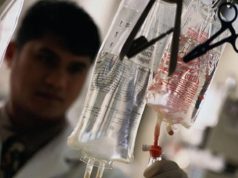Risk for MRSA infections, infections from any cause further reduced with full adherence to decolonization
THURSDAY, Feb. 14, 2019 (HealthDay News) — For patients colonized with methicillin-resistant Staphylococcus aureus (MRSA), postdischarge MRSA decolonization is associated with a reduced risk for infection, according to a study published in the Feb. 14 issue of the New England Journal of Medicine.
Susan S. Huang, M.D., M.P.H., from the University of California Irvine School of Medicine, and colleagues conducted a randomized trial of postdischarge hygiene education (1,058 participants) compared to education plus decolonization (1,063 participants) in patients colonized with MRSA. Decolonization included chlorhexidine mouthwash, baths or showers with chlorhexidine, and nasal mupirocin for five days twice a month for six months.
Participants were followed for one year. The researchers found that MRSA infection occurred in 9.2 and 6.3 percent of the education and decolonization groups, respectively, in the per-protocol population; 84.8 percent of the MRSA infections led to hospitalization. In 23.7 and 19.6 percent of patients in the education and decolonization groups, respectively, infection from any cause occurred; 85.8 percent of the infections led to hospitalization. The decolonization group had a lower risk for MRSA infection (hazard ratio, 0.70), resulting in a lower risk for hospitalization due to MRSA infection (hazard ratio, 0.71). They also had a lower likelihood of clinically judged infection from any cause and infection-related hospitalization (hazard ratios, 0.83 and 0.76, respectively). Participants in the decolonization group who adhered fully to the regimen had fewer MRSA infections and infections from any cause (hazard ratios, 0.56 and 0.60, respectively).
“Twice-monthly decolonization provided protection for many months after discharge,” the authors write.
Several authors disclosed financial ties to the pharmaceutical industry.
Copyright © 2019 HealthDay. All rights reserved.








